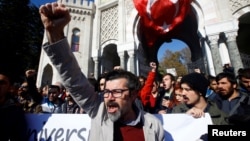Turkey dismissed more than 6,000 more police, civil servants and academics under emergency rule on Friday, continuing a purge in the wake of a failed coup last July, according to decrees issued in the Official Gazette.
The decrees ordered the dismissal of 2,687 police officers, 1,699 officials from the justice ministry, 838 from the health ministry, more than 630 academics and 135 officials from the religious affairs directorate.
They also stated that individuals overseas who are being sought by the Turkish authorities might have their citizenship removed if they fail to return within three months.
Some 120,000 people have been suspended or dismissed since the coup, although thousands of them have since been restored to their posts. More than 41,000 have been jailed pending trial out of 100,000 who have faced investigation.
Parliament, dominated by the ruling AK Party, voted this week to extend emergency rule by another three months in a move the government said was needed to sustain a purge of supporters of U.S.-based Muslim cleric Fethullah Gulen.
Turkey accuses Gulen and his network of followers, which it terms the Gulenist Terror Organisation (FETO), of being behind the July 15 coup attempt. Gulen denies the allegations.
Emergency rule enables the government to bypass parliament in enacting new laws and to limit or suspend rights and freedoms when deemed necessary. It was imposed after the attempted coup and then extended for a second three-month period in October.
Friday's decrees also give state-appointed administrators the right to sell companies they take over. Hundreds of firms, many of them smaller provincial businesses, have been seized in the post-coup crackdown.
One of the decrees allows private security guards to carry guns under certain conditions at work, an apparent response to a shooting claimed by Islamic State at an Istanbul nightclub on New Year's Day in which 39 people were killed.





